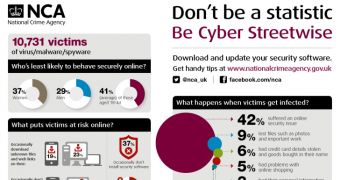UK’s National Crime Agency has started a security awareness campaign, highlighting the dangers computer users expose to by using systems lacking protection solutions when connected to the Internet.
A joint operation between NCA’s National Cyber Crime Unit (NCCU) and the government’s Cyber Streetwise campaign, this initiative reveals statistics pulled from dozens of arrests of individuals across the globe that purchased and distributed malware.
The agency provides some statistics on the individuals that are less likely to adopt secure measure measures online.
As per their report, 10,731 individuals fell victim to malware and 37% of them were women, while 29% were men.
In 19% of the cases, users used mobile phones to download unknown files or access links, which led to malware infection. Incidents involving desktop and laptop computers used for such actions accounted for 23%.
The NCA informs that in 37% of the cases the devices lacked security software that would lead to a lower number of malware infections.
A larger number of users affected by cybercriminal attacks would not apply security software updates as soon as developers made them available. Breaking the numbers per device types, mobile phones accounted for 56%, while 40% were desktop and laptop computers.
“The internet is a great place to explore the world and do business, and the majority of people won’t experience any problems. But for the minority who leave themselves unprotected, not downloading and updating their security software can be very costly.”
"The cost to individuals not only hits their pockets but also their personal and family life, which is why it’s important that everyone takes steps to protect their computer, tablet and mobile,” said the director of the NCCU, Jamie Saunders.
The NCA warns that, apart from risking losing important files, victims whose computers are compromised by malware are also exposed to theft of financial information that often has as a result emptying their bank accounts by purchasing goods in their names.
Cybercriminals can also use these details to access the bank accounts directly and transfer the money to their pockets. This can be conducted through targeted phishing scams.
According to the statistics provided by the NCA, about one percent of the victims suffered damage to their reputation and 3% had personal information accessed without permission.
Two of the most effective measures that can be taken to protect against criminal digital activity are applying the latest security updates for the software installed on the computer and avoiding opening files coming from a suspicious source (emails or websites).

 14 DAY TRIAL //
14 DAY TRIAL //